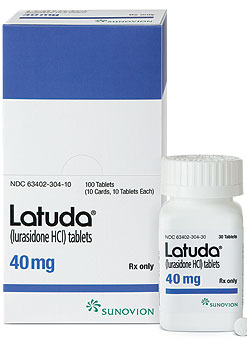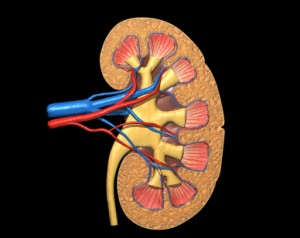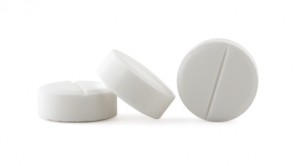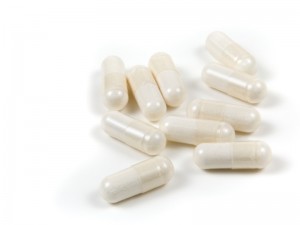FDA Approves Lurasidone for Bipolar Depression in Children and Adolescents
 In March 2018, the US Food and Drug Administration approved the antipsychotic drug lurasidone (Latuda) for the treatment of bipolar depression in children and adolescents aged 10–17 years. Lurasidone was already approved for adults with bipolar depression, as an add-on treatment to the mood stabilizers lithium and valproate, and for schizophrenia in people aged 13 years and up.
In March 2018, the US Food and Drug Administration approved the antipsychotic drug lurasidone (Latuda) for the treatment of bipolar depression in children and adolescents aged 10–17 years. Lurasidone was already approved for adults with bipolar depression, as an add-on treatment to the mood stabilizers lithium and valproate, and for schizophrenia in people aged 13 years and up.
A 6-week clinical trial in 347 youth compared lurasidone (in doses ranging from 20 to 80 mg/day) to placebo and found that those who received lurasidone showed significant improvements in depression compared to those who received placebo. The average dose was below 40 mg/day. The research by Melissa P. DelBello and colleagues was published in the Journal of the American Academy of Child and Adolescent Psychiatry in 2017.
In the study, lurasidone was well-tolerated. Side effects included nausea, sleepiness, minimal weight gain, and insomnia. Lurasidone did not seem to affect glucose, triglycerides, cholesterol, or blood pressure.
Editor’s Note: This is the first drug to be approved for bipolar depression in this age range. This editor (Robert M. Post) has written extensively on the high incidence of childhood onset bipolar disorder in the US, and especially in the offspring of parents with bipolar disorder.
It is important to be alert to the possibilities of depression and bipolar disorder in children in the US (along with related illnesses such as anxiety, oppositional defiant disorder, and attention deficit hyperactivity disorder (ADHD)), as early-onset illness tends to have a more severe long-term course than adult-onset depression and bipolar disorder. A longer delay between the emergence of symptoms and the first treatment for bipolar disorder is also a risk factor for more severe depression, more time depressed, and a poorer outcome in adulthood.
Parents of children aged 2-12 who have mood or behavioral problems are encouraged to consider joining the Child Network at our website, bipolarnews.org (click on the tab for the Child Network). By participating in this research network, parents are able to make a weekly rating of the severity of their children’s symptoms of anxiety, depression, ADHD, oppositional behavior, and mania via the secure website. The ratings can then be shared with the child’s clinicians for easy visualization of the course of symptoms over time, which may help with treatment decisions.
Using Antidepressants During Pregnancy Likely Does Not Increase Autism Risk
In the past year or so, several meta-analyses have analyzed data from numerous studies of a possible link between antidepressant use in pregnancy and autism in the offspring. In a 2017 article in the Journal of Clinical Psychiatry, researcher Chittaranjan Andrade offers a meta-analysis of these previous meta-analyses, and determines that while there is a small link between antidepressant use in pregnancy and autism in the offspring, it is most likely the mother’s depressive illness rather than the medications that is responsible for this link.
Andrade found that antidepressant exposure was linked to an increased risk of autism spectrum disorders in the offspring even when the antidepressant use occurred only before conception occurred, when it could not possibly have affected the future fetus’ physiology. This implies that it is the mother’s illness rather than the antidepressant treatment that is a determinant of autism risk.
Atypical Antipsychotic Drug Aripiprazole Appropriate for Pregnancies
 A 2017 systematic review in the Journal of Affective Disorders found that the atypical antipsychotic medication apripiprazole (Abilify) was relatively safe for use during pregnancy and lactation. Researcher Alessandro Cuomo and colleagues reviewed 93 articles from the last two decades of research.
A 2017 systematic review in the Journal of Affective Disorders found that the atypical antipsychotic medication apripiprazole (Abilify) was relatively safe for use during pregnancy and lactation. Researcher Alessandro Cuomo and colleagues reviewed 93 articles from the last two decades of research.
Placebo-controlled research on medications used during pregnancy are uncommon, due to ethical reservations about assigning women randomly to each group when their fetus may be affected. However, Cuomo and colleagues were able to find some large prospective studies and large database studies that shed light on aripiprazole’s safety during pregnancy. They concluded that the data on aripiprazole during pregnancy and breastfeeding were “relatively reassuring” and that the benefits of aripiprazole outweigh the potential risks.
Risks of relapse upon discontinuing a mood stabilizer can be as high as 80%. Illness in the mother conveys risks to the fetus, so the risk-benefit ratio may suggest that staying on effective aripiprazole treatment during pregnancy and lactation makes sense for many patients.
In a comment on the study reported by Reuters Health, Dr. Jennifer L. Payne of the Johns Hopkins School of Medicine said, “The main reason to discontinue aripiprazole for pregnancy…would be if it is not working and the mother is actively ill, or if she insisted on doing so. In my mind, the literature supports the use of aripiprazole during pregnancy in mothers with serious mental illness who are responding well to the medication.”
Folate Supplements Reduce Autism Rates in Offspring of Women Taking Anti-Epileptic Drugs During Pregnancy
 A 2017 study form Norway suggests that the offspring of women taking anti-epileptic drugs during pregnancy are less likely to develop autism if the women also take folic acid supplements.
A 2017 study form Norway suggests that the offspring of women taking anti-epileptic drugs during pregnancy are less likely to develop autism if the women also take folic acid supplements.
The study by Marte Bjørk and colleagues in the journal JAMA Neurology used data from 104,936 children aged 18 to 36 months. Those whose mothers took anti-epileptic drugs during pregnancy had elevated autism rates, but only if their mothers did not use folic acid supplements. The mothers’ folate levels in weeks 17 to 19 of their pregnancies were inversely related to the degree of autistic traits in their offspring.
Women without epilepsy and women whose epilepsy went untreated during pregnancy had children with similarly low rates of autism to those whose mothers supplemented their anti-epileptic medications with folic acid during pregnancy.
Several Studies Find Lamotrigine is Safe in Pregnancy
 Several studies have now suggested that lamotrigine is safe to use during pregnancy. In June 2017, researcher Gali Pariente and colleagues published a systematic review and meta-analysis in the journal CNS Drugs in which they reported that across 21 studies, lamotrigine use during pregnancy was not linked to an increase in birth defects.
Several studies have now suggested that lamotrigine is safe to use during pregnancy. In June 2017, researcher Gali Pariente and colleagues published a systematic review and meta-analysis in the journal CNS Drugs in which they reported that across 21 studies, lamotrigine use during pregnancy was not linked to an increase in birth defects.
In November 2017, a small study from an Israeli medical center reported data from 83 women who received lamotrigine during their first trimester of pregnancy. The study by Merav Cohen-Israel and colleagues in the British Journal of Clinical Pharmacology found that lamotrigine use was not linked to congenital malformations, neurodevelopmental disorders, or withdrawal symptoms in the offspring.
Of the 83 women, 76 received lamotrigine alone, four received it in combination with clonazepam, two with carbamazepine, and one in combination with both levetiracetam and phenytoin.
Management of Unipolar and Bipolar Depression During Pregnancy
 At the Maryland Psychiatric Research Society’s continuing medical education conference in November, Lauren Osbourne, Assistant Director of the Women’s Mood Disorders Clinic at Johns Hopkins Hospital, gave a presentation on the management of mood and anxiety during pregnancy and lactation. She had a number of important ideas for physicians and patients to consider in their decision-making process.
At the Maryland Psychiatric Research Society’s continuing medical education conference in November, Lauren Osbourne, Assistant Director of the Women’s Mood Disorders Clinic at Johns Hopkins Hospital, gave a presentation on the management of mood and anxiety during pregnancy and lactation. She had a number of important ideas for physicians and patients to consider in their decision-making process.
According to Osbourne, 60%-70% of pregnant women with unipolar depression who discontinue their antidepressants relapse. Of those with bipolar disorder who discontinue their mood stabilizers, 85% relapse, while 37% of those who stay on their medications relapse.
Something to consider when deciding whether to continue medication while pregnant is that depression in pregnancy carries its own risks for the fetus. These include preterm delivery, low birth weight, poor muscle tone, hypoactivity, increased cortisol, poor reflexes, and increased incidence of attention deficit hyperactivity disorder (ADHD) and other behavioral disorders.
The placenta makes an enzyme 11-BHSD2 that lowers the stress hormone cortisol in the baby. However, this enzyme is less active in depression, exposing the fetus to higher levels of cortisol.
Thus, the decision about whether to continue medications during pregnancy should consider the risks to the fetus of both the mother’s depression and the mother’s medications.
Most antidepressants are now considered safe during pregnancy. There have been reports of potential problems, but these data are often confounded by the fact that women with more severe depression are more likely to require antidepressants, along with other risk variables such as smoking or late delivery (after 42 weeks). When these are accounted for by using matched controls, the apparent risks of certain antidepressants are no longer significant. This includes no increased risk of persistent pulmonary hypertension, autism, or cardiac malformations.
There may be a possible increased risk of Neonatal Adaption Syndrome (NAS) in the first weeks of life in babies who were exposed to selective serotonin reuptake inhibitor (SSRI) antidepressants in the third trimester. This syndrome presumably results from antidepressant withdrawal, and can include respiratory distress, temperature changes, decreased feeding, jitteriness/irritability, floppiness or rigidity, hypoglycemia, and jaundice. There is not yet a robust literature on the syndrome, but Osbourne suggested that it disappears within 2 weeks of birth.
In her practice, Osbourne prefers to prescribe sertraline, which has the best safety data, along with fluoxetine. Sertraline is also OK for breastfeeding. There is less data on bupropion, but it also appears to be safe during pregnancy. Endocrine and enzyme changes in pregnancy typically cause a 40% to 50% decrease in concentrations of antidepressants, so doses of antidepressants typically must be increased in order to maintain their effectiveness.
Osbourne ranked mood stabilizers for bipolar disorder, from safest to most worrisome. Lamotrigine is safest. There is no evidence linking it to birth defects, but higher doses are required because of increased clearance during pregnancy. Lithium is next safest. There are cardiac risks for one in 1,200 patients, but these can be monitored. Carbamazepine is third safest. One percent of babies exposed to carbamazepine will develop spina bifida or craniofacial abnormalities. Valproate is least safe during pregnancy. Seven to ten percent of babies exposed to valproate will develop neural tube defects, other malformations, or developmental delay, with a mean decrease of 9 IQ points. The atypical antipsychotics all appear safe so far.
Alternatives and Adjuncts to Medications in Pregnancy
Continuing Lithium Treatment Does Not Increase Kidney Failure
 A risk of long-term lithium treatment is that it can cause kidney damage. However, a new study suggests that continuing lithium treatment after a diagnosis of chronic kidney disease does not necessarily increase the risk of irreversible end-stage kidney disease, which is defined as either the need for either chronic dialysis or a kidney transplant.
A risk of long-term lithium treatment is that it can cause kidney damage. However, a new study suggests that continuing lithium treatment after a diagnosis of chronic kidney disease does not necessarily increase the risk of irreversible end-stage kidney disease, which is defined as either the need for either chronic dialysis or a kidney transplant.
The 2017 study by researcher Lars Kessing and colleagues in the journal Acta Psychiatrica Scandinavica used Danish health databases to track data from all individuals who received a diagnosis of chronic kidney disease between 1995 and 2012 and also had a history of lithium treatment (754 patients) or anticonvulsant treatment (5,004 patients). Kessing and colleagues found that patients who continued taking lithium after an initial diagnosis of chronic kidney disease had decreased rates of end-stage kidney disease. This also held true for those who continued anticonvulsant treatment after a diagnosis of kidney disease.
One point of uncertainty was introduced by the finding that the subset of participants who were taking lithium specifically to treat bipolar disorder did have a higher rate of end-stage kidney disease. This was not true of the participants who were taking anticonvulsants to treat bipolar disorder.
Kessing and colleagues concluded that after an initial diagnosis of chronic kidney disease, continuing lithium did not necessarily increase end-stage kidney disease. Switching to an anticonvulsant, as is sometimes the practice after a kidney disease diagnosis, may not confer any benefit.
Lithium Treatment Lowers Suicide Rate in People with Bipolar Disorder
A large study that made use of a Swedish health database has shown that lithium reduces suicide rates in bipolar disorder. The study by researcher Jie Song and colleagues was published in the American Journal of Psychiatry in 2017.
The study included eight years of data from 51,535 people with bipolar disorder. During that time, there were 10,648 suicide-related events recorded, such as suicide attempts or completed suicides. The researchers compared suicide rates when patients were taking lithium to rates when they were off the drug, and found that lithium reduced attempted or completed suicide by 14%. Song and colleagues also looked at suicide rates for people taking valproate, and found that these were no better than when patients were off valproate, implying that treatment alone is not enough to reduce the suicide rate and the benefit is specific to lithium use.
Song and colleagues estimate that 12% of the suicide-related events among the patients included in the study might have been avoided if the patients had taken lithium for the entire study period. While there are other clinical considerations to make when selecting an appropriate treatment for a given patient, the researchers suggest that lithium treatment should be considered for patients with bipolar disorder who have expressed suicidal intentions or who are otherwise at risk for suicide.
Gabapentin May Increase Opioid-Related Deaths
 The anticonvulsant gabapentin is sometimes prescribed for chronic pain conditions along with opioids. A 2017 article by researcher Tara Gomes in the journal PLOS Medicine reports that compared to opioid prescriptions alone, co-prescription of gabapentin increases the risk of an opioid-related death by 49%. The risk was increased by 60% for those receiving moderate or high doses of gabapentin (those above 900 mg/day).
The anticonvulsant gabapentin is sometimes prescribed for chronic pain conditions along with opioids. A 2017 article by researcher Tara Gomes in the journal PLOS Medicine reports that compared to opioid prescriptions alone, co-prescription of gabapentin increases the risk of an opioid-related death by 49%. The risk was increased by 60% for those receiving moderate or high doses of gabapentin (those above 900 mg/day).
The increased risk when the drugs are taken together may be because both gabapentin and opioids depress the respiratory system. Opioids also slow the gastrointestinal system, meaning that more gabapentin is absorbed by the intestines than occurs when gabapentin is prescribed alone.
Gomes and colleagues looked at cases of patients who were prescribed opioids and had opioid-related deaths, and matched these with similar patients who had not died while taking prescription opioids during the same time period. The researchers found that having taken gabapentin in the previous 120 days dramatically increased the risk of death from opioid-related causes.
Gomes and colleagues suggest that caution should be used when prescribing gabapentin and opioid drugs at the same time.
Omega-3 Fatty Acids Improve Executive Function in Youth with Mood Disorders
A 2017 study by Anthony T. Vesco and colleagues in The Journal of Child Psychology and Psychiatry suggests that in youth with depression or bipolar not otherwise specified (BP-NOS), omega-3 fatty acid supplements improve executive functioning and behavior regulation compared to placebo.
Ninety-five participants aged 7–14 years received two capsules daily of either omega-3 fatty acids (1.87g total per day, mostly consisting of EPA) or placebo for 12 weeks. Those who received omega-3s showed improvement in executive functioning (which can include planning and decision-making), behavioral regulation, and metacognition, as rated by their parents.
Editor’s Note: Since omega-3 fatty acids have no known side effects, there is little reason not to try them in youth with depression or bipolar disorder.




